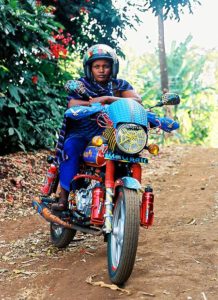Carmen Thomas ist die erste Frau, die das Aktuelle Sportstudio im ZDF moderiert hat. Mit ihrem ...
Wie alles begann
von Dr. Astrid Mignon Kirchhof Als ich von Professor Martin Sabrow gefragt wurde, ob ich die Leitung...
Quelle: https://wismut.hypotheses.org/98
Gegenbilder
Wo Worte gesprochen werden, gibt es meist auch Widerworte. Wo Erzählungen gesponnen werden, formen sich Gegen-Narrative. Und so gibt es selbstverständlich zu bildlichen Aussagen auch Gegen-Bilder: Bilder, die in Form, Inhalt und Gebrauch auf andere Bilder reagieren, indem sie diese in Frage stellen oder ihnen widersprechen. Bilder, die als generative Kräfte im historischen Prozess wirken. Oder aber Bilder, die marginalisiert beziehungsweise gar nicht gezeigt wurden und erst zu einem späteren Zeitpunkt ein bislang herrschendes Narrativ in Frage stellen können.
Insbesondere in Bezug auf das Massenmedium Fotografie ist es lohnend, über die Bedeutung von Gegenbildern nachzudenken. Schließlich wurde gerade diesem Medium bei seiner Entstehung zunächst unbedingte Objektivität und Authentizität in der Abbildung von Gegenständen, Personen und Situationen zugeschrieben. Doch bedingen Fotografien häufig eine Steuerung von Sehweisen.
[...]
Alice und Hella Hirsch – Zwei Schwestern im Berliner Widerstand
von Franziska Karow Die beiden Schwestern Hella und Alice Hirsch waren ab 1939 Mitglieder der Ber...
Wissenschaftliche/r Mitarbeiter*in im Forschungsdatenmanagement (m/w/d) gesucht. Entgeltgruppe 13 TV-L (50%), befristet bis 31.03.2022, Bewerbung bis 31.10.2020.
Das Leibniz-Institut für Geschichte und Kultur des östlichen Europa (GWZO) e.V. erforscht in vergleichender Perspektive die historischen und kulturellen Entwicklungsprozesse in der Region zwischen Ostsee, Schwarzem Meer und Adria von der Spätantike bis zur Gegenwart. Die große geographische Reichweite seines Forschungsprogramms bedingt einen besonderen Forschungsansatz, der Komparatistik, Interdisziplinarität und Transnationalität vereinigt, und der zudem die gesamte historische Tiefe vom Übergang der Antike zum Mittelalter bis in die Gegenwart in den Blick nimmt. Das in der Leipziger Innenstadt ansässige GWZO beschäftigt ca. 70 Mitarbeiter*innen aus dem In- und Ausland.
Für das in der Abteilung 4 „Wissenstransfer und Vernetzung“ des Institutes seit April 2019 angesiedelte, in Kooperation mit drei weiteren Forschungsinstituten und der BSB München durchgeführte und von der Deutschen Forschungsgemeinschaft (DFG) finanzierte Verbundprojekt „Forschungsdatendienst für Ost-, Ostmittel- und Südosteuropaforschung (OstData)“
suchen wir zum 01.12.
[...]
Quelle: https://dhd-blog.org/?p=14577
Karikaturen in der Schwäbischen Rundschau 1945 als Propagandamittel
Von Cedric Bolsinger und Pascal Oehme | Universität Stuttgart Ziel dieses Beitrags ist es zu un...
Sollen minderjährige Flüchtlinge bevorzugt aufgenommen werden?
Angesichts der Brandes des Flüchtlingslagers Moria wurde gefordert, doch zumindest und vor ...
Sollen minderjährige Flüchtlinge bevorzugt aufgenommen werden?
Angesichts der Brandes des Flüchtlingslagers Moria wurde gefordert, doch zumindest und vor ...
Baumnetze – Geschichte(n) sammeln, teilen, erforschen
Von Solvejg Nitzke Dieser Text, den ich Saxorum schon viel zu lange schulde, wird eine Mischung aus ...
14. Oktober 1620: Die Ächtung niederösterreichischer Rebellen
Während die kaiserlichen Truppen und die der Katholischen Liga noch in Böhmen operierten, ...
